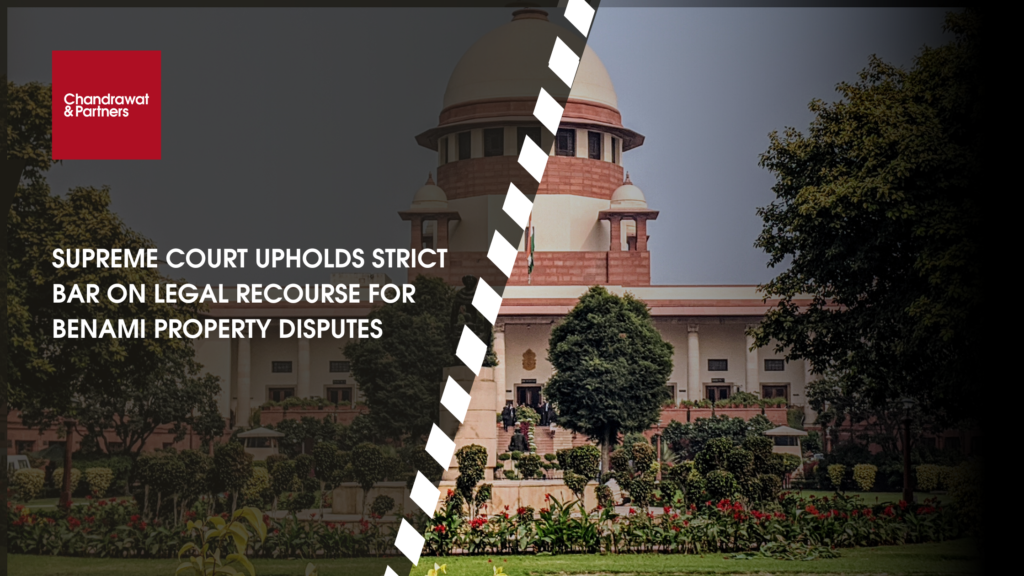
Share :
SUPREME COURT UPHOLDS STRICT BAR ON LEGAL RECOURSE FOR BENAMI PROPERTY DISPUTES
The recent Supreme Court case of C. Subbiah @ Kadambur Jayaraj and Others vs. The Superintendent of Police & Others offers a fascinating glimpse into the complexities of property transactions and criminal prosecution in India. This case raises interesting questions about property transactions and criminal prosecution in India. The complainant in this case alleged that the property deal involved forgery or misrepresentation on the part of the appellants, leading them to face criminal charges.
CASE BACKGROUND
The Supreme Court case involved a dispute between C. Subbiah (alias Kadambur Jayaraj) and others (the appellants) and an individual referred to as “the complainant” in the court documents. The appellants were likely charged with several offenses under the Indian Penal Code (“IPC”), including cheating (Section 420), criminal conspiracy (Section 120B), criminal intimidation (Section 506), and defamation (Section 294). These charges likely stemmed from a real estate transaction between the appellants and the complainant. The complainant might have alleged that the property deal involved forgery or misrepresentation on the part of the appellants, leading them to face criminal charges. The appellants, on the other hand, likely contested these charges, arguing that the transaction was legitimate, and they had no criminal intent.
LEGAL ISSUES:
The central legal question addressed by the Supreme Court was whether the person who provides the consideration for a Benami property can initiate legal proceedings, both civil and criminal, against the person holding the property in their name (benamidar).
- Benami Transactions: The case might have centered around a property deal where the ownership wasn’t directly in the name of the person financing it. This is known as a “benami” transaction, which can be legal in India under certain circumstances.
- Misrepresentation or Fraud: The crux of the case could be whether the appellants misrepresented the property or its details during the transaction. If the complainant can prove this, it could strengthen the cheating and criminal conspiracy charges.
The respondent, feeling cheated, filed a criminal complaint against the appellant under Sections 406 and 420 of the IPC alleging criminal breach of trust and cheating.
KEY FINDINGS AND OBSERVATIONS:
- Section 4(1) of The Benami Act bars the person who paid consideration (complainant) from recovering property held benami either from the person in whose name it is held or anyone else. It nullifies any defense or claim of ownership by the consideration-provider.
- Section 4(2) of The Benami Act prohibits the person who paid consideration from initiating civil proceedings to enforce any right in respect of the benami property.
The prohibitions under Section 4 indicate that the legislature’s intent was to not give recognition to rights arising from benami transactions, which are prohibited.
Allowing criminal prosecution on the same set of allegations that cannot sustain a civil claim would be “impermissible in law” and tantamount to abuse of the legal process.
The court noted that if such allegations do not constitute an actionable civil wrong due to Section 4, then prosecution on the very same facts cannot be permitted.
IMPLICATIONS OF THE RULING:
This authoritative interpretation by the Supreme Court has settled the law by upholding the strict prohibition under Section 4 on initiating any civil or criminal proceedings by a person who paid consideration against the holder of benami property. It has closed the window for such persons to circumvent the civil bar by pursuing criminal cases.
The ruling could have a bearing on resolving disputes arising from benami transactions, which are made for purposes of tax evasion, money laundering or holding property for others. It underscores the legislative intention to not accord any legal rights based on prohibited benami deals.
For more information or queries, please email us at
enquiries@chandrawatpartners.com



